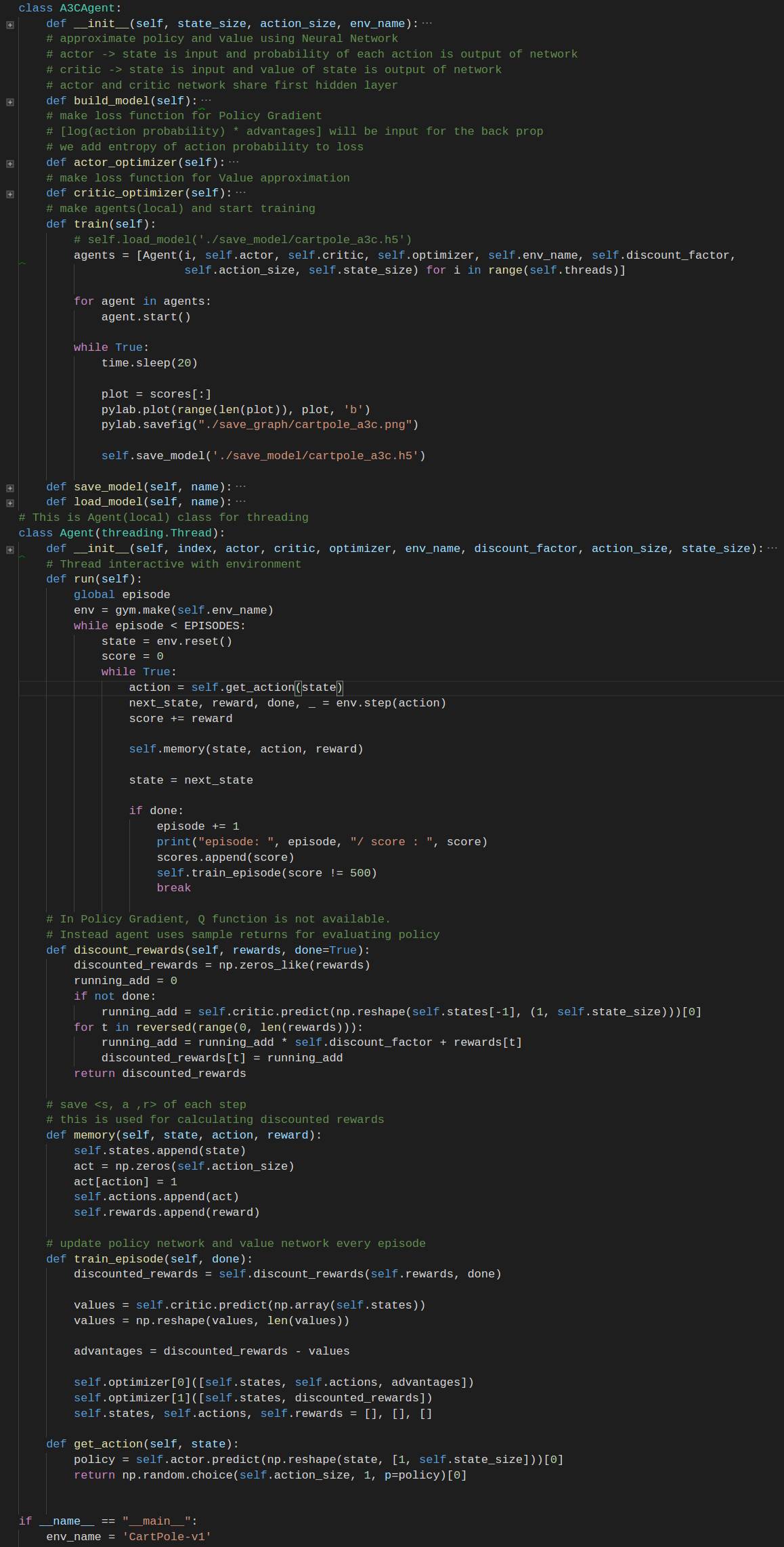强化学习 cartpole_a3c
https://github.com/rlcode/reinforcement-learning/blob/master/2-cartpole/5-a3c/cartpole_a3c.py
import threading
import numpy as np
import tensorflow as tf
import pylab
import time
import gym
from keras.layers import Dense, Input
from keras.models import Model
from keras.optimizers import Adam
from keras import backend as K
# global variables for threading
episode = 0
scores = []
EPISODES = 2000
# This is A3C(Asynchronous Advantage Actor Critic) agent(global) for the Cartpole
# In this example, we use A3C algorithm
class A3CAgent:
def __init__(self, state_size, action_size, env_name):
# get size of state and action
self.state_size = state_size
self.action_size = action_size
# get gym environment name
self.env_name = env_name
# these are hyper parameters for the A3C
self.actor_lr = 0.001
self.critic_lr = 0.001
self.discount_factor = .99
self.hidden1, self.hidden2 = 24, 24
self.threads = 8
# create model for actor and critic network
self.actor, self.critic = self.build_model()
# method for training actor and critic network
self.optimizer = [self.actor_optimizer(), self.critic_optimizer()]
self.sess = tf.InteractiveSession()
K.set_session(self.sess)
self.sess.run(tf.global_variables_initializer())
# approximate policy and value using Neural Network
# actor -> state is input and probability of each action is output of network
# critic -> state is input and value of state is output of network
# actor and critic network share first hidden layer
def build_model(self):
state = Input(batch_shape=(None, self.state_size))
shared = Dense(self.hidden1, input_dim=self.state_size, activation='relu', kernel_initializer='glorot_uniform')(state)
actor_hidden = Dense(self.hidden2, activation='relu', kernel_initializer='glorot_uniform')(shared)
action_prob = Dense(self.action_size, activation='softmax', kernel_initializer='glorot_uniform')(actor_hidden)
value_hidden = Dense(self.hidden2, activation='relu', kernel_initializer='he_uniform')(shared)
state_value = Dense(1, activation='linear', kernel_initializer='he_uniform')(value_hidden)
actor = Model(inputs=state, outputs=action_prob)
critic = Model(inputs=state, outputs=state_value)
actor._make_predict_function()
critic._make_predict_function()
actor.summary()
critic.summary()
return actor, critic
# make loss function for Policy Gradient
# [log(action probability) * advantages] will be input for the back prop
# we add entropy of action probability to loss
def actor_optimizer(self):
action = K.placeholder(shape=(None, self.action_size))
advantages = K.placeholder(shape=(None, ))
policy = self.actor.output
good_prob = K.sum(action * policy, axis=1)
eligibility = K.log(good_prob + 1e-10) * K.stop_gradient(advantages)
loss = -K.sum(eligibility)
entropy = K.sum(policy * K.log(policy + 1e-10), axis=1)
actor_loss = loss + 0.01*entropy
optimizer = Adam(lr=self.actor_lr)
updates = optimizer.get_updates(self.actor.trainable_weights, [], actor_loss)
train = K.function([self.actor.input, action, advantages], [], updates=updates)
return train
# make loss function for Value approximation
def critic_optimizer(self):
discounted_reward = K.placeholder(shape=(None, ))
value = self.critic.output
loss = K.mean(K.square(discounted_reward - value))
optimizer = Adam(lr=self.critic_lr)
updates = optimizer.get_updates(self.critic.trainable_weights, [], loss)
train = K.function([self.critic.input, discounted_reward], [], updates=updates)
return train
# make agents(local) and start training
def train(self):
# self.load_model('./save_model/cartpole_a3c.h5')
agents = [Agent(i, self.actor, self.critic, self.optimizer, self.env_name, self.discount_factor,
self.action_size, self.state_size) for i in range(self.threads)]
for agent in agents:
agent.start()
while True:
time.sleep(20)
plot = scores[:]
pylab.plot(range(len(plot)), plot, 'b')
pylab.savefig("./save_graph/cartpole_a3c.png")
self.save_model('./save_model/cartpole_a3c.h5')
def save_model(self, name):
self.actor.save_weights(name + "_actor.h5")
self.critic.save_weights(name + "_critic.h5")
def load_model(self, name):
self.actor.load_weights(name + "_actor.h5")
self.critic.load_weights(name + "_critic.h5")
# This is Agent(local) class for threading
class Agent(threading.Thread):
def __init__(self, index, actor, critic, optimizer, env_name, discount_factor, action_size, state_size):
threading.Thread.__init__(self)
self.states = []
self.rewards = []
self.actions = []
self.index = index
self.actor = actor
self.critic = critic
self.optimizer = optimizer
self.env_name = env_name
self.discount_factor = discount_factor
self.action_size = action_size
self.state_size = state_size
# Thread interactive with environment
def run(self):
global episode
env = gym.make(self.env_name)
while episode < EPISODES:
state = env.reset()
score = 0
while True:
action = self.get_action(state)
next_state, reward, done, _ = env.step(action)
score += reward
self.memory(state, action, reward)
state = next_state
if done:
episode += 1
print("episode: ", episode, "/ score : ", score)
scores.append(score)
self.train_episode(score != 500)
break
# In Policy Gradient, Q function is not available.
# Instead agent uses sample returns for evaluating policy
def discount_rewards(self, rewards, done=True):
discounted_rewards = np.zeros_like(rewards)
running_add = 0
if not done:
running_add = self.critic.predict(np.reshape(self.states[-1], (1, self.state_size)))[0]
for t in reversed(range(0, len(rewards))):
running_add = running_add * self.discount_factor + rewards[t]
discounted_rewards[t] = running_add
return discounted_rewards
# save <s, a ,r> of each step
# this is used for calculating discounted rewards
def memory(self, state, action, reward):
self.states.append(state)
act = np.zeros(self.action_size)
act[action] = 1
self.actions.append(act)
self.rewards.append(reward)
# update policy network and value network every episode
def train_episode(self, done):
discounted_rewards = self.discount_rewards(self.rewards, done)
values = self.critic.predict(np.array(self.states))
values = np.reshape(values, len(values))
advantages = discounted_rewards - values
self.optimizer[0]([self.states, self.actions, advantages])
self.optimizer[1]([self.states, discounted_rewards])
self.states, self.actions, self.rewards = [], [], []
def get_action(self, state):
policy = self.actor.predict(np.reshape(state, [1, self.state_size]))[0]
return np.random.choice(self.action_size, 1, p=policy)[0]
if __name__ == "__main__":
env_name = 'CartPole-v1'
env = gym.make(env_name)
state_size = env.observation_space.shape[0]
action_size = env.action_space.n
env.close()
global_agent = A3CAgent(state_size, action_size, env_name)
global_agent.train()




